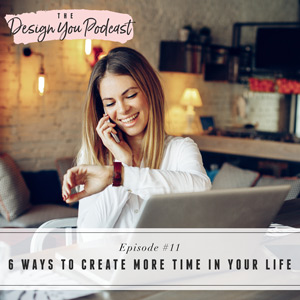
Here we are, rolling into summer and the half-way mark of the year. As usual, time is flying by, which may be causing some of you to stress out about how much you’re getting done and how in the world you’re going to finish out the year feeling more accomplished than you do now?!
Because I’ve been where you are and can now say that I’m excited about what I’ve accomplished in the past 5 months, I am going to share my process of how to create more time. That’s right, I said create time. What I’m talking about today is a completely different way of looking at and thinking about time that will transform your perception of how it works and how you can influence it.
Join me today and learn how you can use your time more effectively than ever – for the rest of this year and beyond! Stick with me here, friends, as this isn’t your everyday podcast episode on time management. If you’re ready to be in the driver’s seat and stop being a victim of time, you’re going to find incredible value in today’s episode.
Download The Free Worksheet to help you map out how to use all six of these steps to most effectively create time in both your life and your business.





